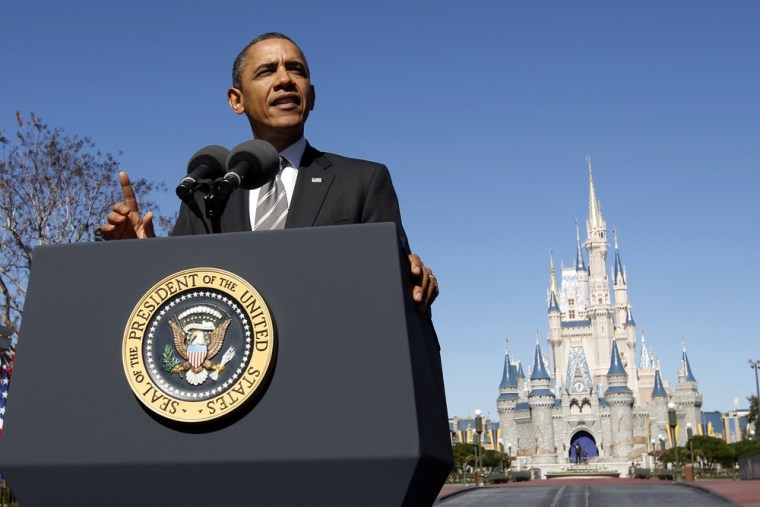America's hotel industry is ailing; President Barack Obama thinks he has the cure.
In a bid to reverse a downturn in international tourism, Obama this week announced a plan to streamline the visa procurement process and make other changes.
"The fact that the president recognized the importance of international tourism is an incredibly positive move," said Jim Evans, CEO of Brand USA, a public-private tourism promotion organization. "It definitely will have a very positive impact on hotel occupancies," which in turn will boost profitability and growth in tourism-related jobs. "It just has a positive effect on all metrics for hospitality."
The timing is also good. Analysts say a surge of visitors from places like China and Brazil also could help offset a potential drop in demand if Europe's economic troubles grow.
The United Nation's World Tourism Organizations predicts that the number of international travelers will hit the 1 billion mark this year, but analysts say the United States has been missing out on these visitors and their economic potential because the time-consuming, expensive process of obtaining a visa deters many would-be tourists.
Foreign tourists are universally coveted: They pay for hotel rooms, eat in restaurants, shop and pay all of the associated taxes that go along with these expenditures. When they go back to their home countries, the money they spend stays behind.
Yet even as more people travel internationally, America's share of that market dropped from 17 percent in 2000 to 11 percent in 2010. In an announcement at Walt Disney World in Orlando on Thursday, Obama unveiled his plan to reverse the decline.
"Just looking at the sheer numbers, it's going to be huge," said Kathleen Matthews, executive vice president of public affairs at Marriott International and member of the United States Travel and Tourism Advisory Board. "Reducing the wait time is going to be tremendous."
The administration's goal of reducing visa wait times to 21 days from months will open up the floodgates, she predicted. "I think within three months, you could see [an] increased flow" of foreign visitors.
Owners and managers of hotels in major gateway cities like New York, Miami, Orlando, San Francisco, Los Angeles and Las Vegas will be early beneficiaries, according to David Loeb, senior hotel research analyst at Robert W. Baird & Co. Much of the U.S.-bound tourism coming from emerging markets tends to be from affluent consumers, so boutique and luxury properties will fare well. Group-oriented hotels will benefit too; many Chinese like to travel in large groups, for example.
Further down the road, midtier hotels will also benefit from the surge in international visitors, predicts Robert Mandelbaum, director of research information services at PKF Hospitality Research. "I think if you open it up to more leisure travelers, more middle class ... you might see more benefit to moderately priced hotels," he said.
Brands that offer fewer frills and amenities than their full-service counterparts like Courtyard by Marriott and Hilton Garden Inn could be attractive to middle-class travelers who don't have the budget for a five-star stay but want the familiarity of a well-known brand.
Loeb says global hotel companies already have been laying the groundwork by growing their footprints abroad. Intercontinental Hotels & Resorts, for instance, has made an aggressive push into the domestic Chinese market. "It's building that loyalty and building that familiarity," Loeb said. When travelers are looking for a place to stay when visiting the U.S., they'll gravitate toward brands they already know. Marriott also is hoping to boost foreign tourist bookings by building hotels in visitors' home countries. Matthews says the company plans to build 100 of its midlevel Fairfield Inn hotels in Brazil over the next decade.
American hotel brands are getting ready for more international visitors in a variety of ways, hiring more bilingual employees, offering instruction in languages like Portuguese and Mandarin along with training in cultural differences and sensitivities. Beginning last year, Marriott International, Starwood Hotels & Resorts and Hilton Worldwide started rolling out welcome programs for Chinese travelers that include perks like Chinese food and newspapers to help visitors feel at home. Some are now adding outreach efforts for the Brazilian and Indian markets.
Baird's Loeb said American hotels will be able to enjoy higher occupancies and room rates for another couple of years before the number of hotel rooms starts to catch up to the increase in demand. "We are still very much in a supply-constrained environment," he said, predicting less than a 1 percent growth in the number of hotel rooms throughout the country both this year and next.
"A lot of that has to do with the financing environment" as lenders continue to deal with the hangover of soured commercial loans. For travelers, this might translate to annoyances like higher prices and less availability, but for hotels, it's a welcome bright spot.
